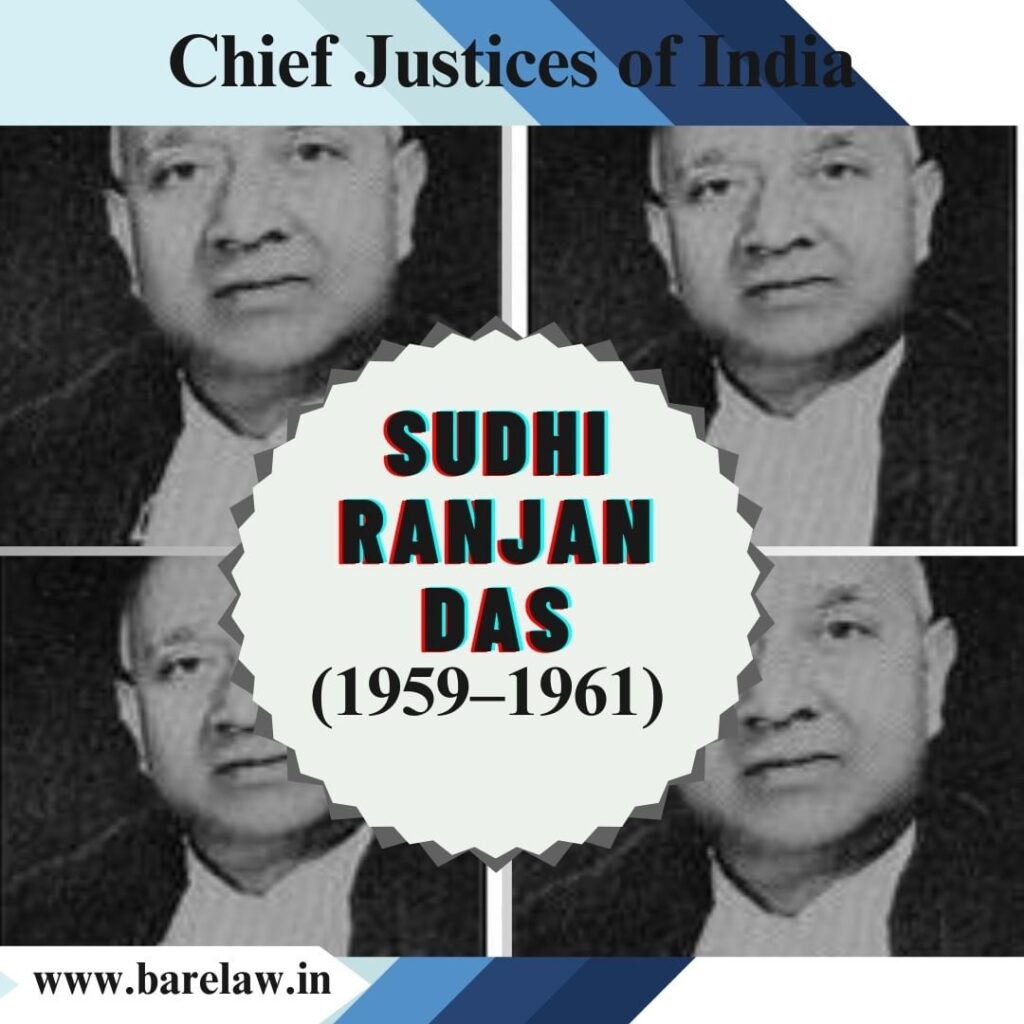
Table of Contents
Sudhi Ranjan Das: India’s Visionary Chief Justice (1959-1961)
Sudhi Ranjan Das: India’s Visionary Chief Justice (1959-1961)
Sudhi Ranjan Das, a name etched in the annals of Indian legal history, served as the Chief Justice of India from 1959 to 1961. During his tenure, he left an indelible mark on the Indian judiciary through his visionary leadership, landmark judgments, and unwavering commitment to upholding the principles of justice and equality.
In this article, we delve into the life and achievements of Sudhi Ranjan Das, shedding light on his significant contributions to the Indian legal landscape.
Early Life and Education
Born on October 13, 1897, in a small village in Bengal, Sudhi Ranjan Das displayed an early aptitude for academics. His journey through the corridors of education led him to Presidency College in Calcutta, where he excelled in his studies. Subsequently, he pursued a degree in law at the University of Calcutta, laying the foundation for his illustrious legal career.
Das was called to the Bar at the Calcutta High Court in 1923, marking the commencement of his professional journey in the legal realm. His dedication, legal acumen, and passion for justice soon caught the attention of legal luminaries and peers alike.
Rise to Prominence
Sudhi Ranjan Das’ ascent in the legal profession was meteoric. His remarkable proficiency in various branches of law and his eloquence in courtroom proceedings garnered him recognition as a legal prodigy. His involvement in significant cases catapulted him to the forefront of the legal community.
In 1945, Das was appointed as a Judge of the Calcutta High Court, where he continued to distinguish himself with his insightful judgments. His judicious temperament, coupled with a deep sense of justice, led to his appointment as the Chief Justice of the Calcutta High Court in 1954, marking a pivotal moment in his career.
Chief Justice of India
Das assumed the role of Chief Justice of India in 1959, a position that allowed him to shape the course of the country’s legal landscape. His tenure coincided with a period of great importance in India’s history, marked by significant social and legal developments.
- Land Reform and Justice: One of Das’ most notable contributions was his support for land reform measures aimed at addressing land inequalities in India. He championed the cause of landless farmers and played a pivotal role in shaping land reform policies.
- Judicial Reforms: As Chief Justice, Das advocated for comprehensive judicial reforms. He envisioned a more accessible and efficient judiciary that could cater to the needs of the burgeoning Indian population. His recommendations laid the foundation for subsequent reforms in the Indian judicial system.
- Landmark Judgments: Das presided over several landmark cases that have had a lasting impact on Indian jurisprudence. His judgments in cases related to fundamental rights, property rights, and civil liberties underscored his commitment to justice and equality.
- Defender of Fundamental Rights: Das was a staunch defender of fundamental rights enshrined in the Indian Constitution. He believed in the importance of safeguarding individual liberties and ensuring that justice was accessible to all, regardless of their social or economic status.
Legacy and Impact
Sudhi Ranjan Das’ legacy endures through his contributions to the Indian legal system. His commitment to justice, coupled with his deep understanding of legal principles, has left an indomitable mark on the judiciary. His advocacy for land reform and judicial modernization continues to influence policy discussions in contemporary India.
Das’ tenure as Chief Justice of India was characterized by a steadfast commitment to upholding the principles of justice and equality. His judgments and legal opinions have served as guiding lights for generations of legal practitioners and scholars.
Conclusion
Sudhi Ranjan Das, India’s visionary Chief Justice from 1959 to 1961, will forever be remembered as a jurist who dedicated his life to the pursuit of justice and legal excellence. His impact on the Indian judiciary, through landmark judgments, advocacy for land reform, and calls for judicial modernization, remains an integral part of India’s legal heritage.
As we reflect on his life and contributions, we are reminded of the enduring importance of a just and equitable legal system in upholding the democratic values of the nation. Sudhi Ranjan Das’ legacy continues to inspire those who strive for a more just and inclusive society through the rule of law.





